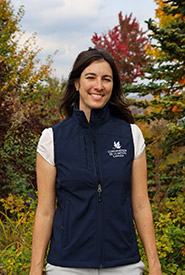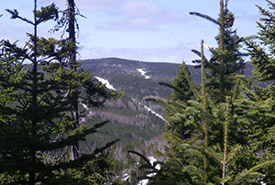Breaking barriers and building determination: Celebrating women in conservation

Marie-Andrée Boisvert (Photo by NCC)
By Marie Andrée Boisvert – program director for eastern Quebec
International Women's Day is an opportunity to remember that women around the world have strived and continue to work for respect and equity.
Women have played a crucial role in conservation efforts throughout history and their contributions are more important than ever before. As the world faces a growing number of environmental challenges, including climate change, habitat destruction and biodiversity loss, women are leading the way in efforts to protect the planet.
Drawing strength from people who inspire you
As a woman working in conservation at the Nature Conservancy of Canada (NCC), I am constantly inspired by the amazing women around me. From my colleagues in the field to the women leading our organization, I draw strength from their knowledge, expertise and passion for protecting the natural world.
Women have shown remarkable determination and resilience in the face of environment challenges, playing a vital role in conservation efforts. Despite facing barriers and obstacles, women have continued to push for change and to make a difference in the world. Whether conducting research on endangered species, managing conservation projects or inspiring others to get involved, women are showing that they have the knowledge, skills and determination to make a lasting impact. Their determination and resilience is a testament to their commitment to creating a more sustainable future for us all.
As a biologist working in the field of natural environment protection, resilience is essential for sustaining life on Earth. Natural ecosystems find their strength and support in the richness of their biodiversity. This allows them to adapt, for example, to new climatic conditions. By being resilient, these ecosystems buffer against climatic conditions. As a result, we must ensure that the health of our natural ecosystems is maintained to ensure better collective and individual resilience.
Despite the under-representation of women in science, there are some who are recognized. I am thinking of Farah Alibay, an aerospace engineer at NASA who piloted the Perseverance robot on Mars. Less well known to the public are the twins Suzanne and Rachelle Gaudet who work in the biomedical field; one as a team leader in a large pharmaceutical company working to find cures for cancer and Alzheimer's disease and the other as a professor of molecular and cellular biology as well as co-director of the bachelor of science program in biology, physics and chemistry at Harvard University. These three women, whether they explore the infinitely large or the impossibly small, have carved out their own paths and made a place for themselves in the world of science. They take the time make accessible to a lay audience their work and share their passion, paving the way for future generations of women scientists.

Forillon Corridor, Gaspé Peninsula (Photo by NCC)
More specifically in conservation, there are numerous women working to build a thriving world. For example Claire Ducharme, regional vice-president NCC in Quebec, has a 30-year career in environmental conservation and has been guiding NCC’s work to accelerate the pace of conservation in the province since last year. Kateri Monticone, director, strategic conservation and innovation at NCC, carries out large-scale projects in collaboration with multiple key players, such as the Ecological Corridors initiative. With support from the Trebek Initiative, a new joint venture between the National Geographic Society and the Royal Canadian Geographical Society, she will lead the development of a six-part video series highlighting successful wildlife corridors across the country, with the intention of educating lawmakers, landowners and citizens about the delicate time we are in, and what can be done to protect wildlife if we work together.
Women have made significant contributions to the field of science, especially in conservation biology. Women researchers have brought new perspectives and insights to the field, helping to advance our understanding of the natural world and the best way to protect it. Women must continue to establish their place in science at every level while not hesitating to express their leadership.
Women are also leading the way in conservation management. Organizations such as NCC are recognized as a Great Place to Best Workplace Managed by Women. NCC’s is one of the world’s leading conservation organizations, with a goal to protect Canada’s most important national treasures. An organization led by women at all levels, from Catherine Grenier, our CEO, to our Board members and staff, NCC reflects the growing role of women in conservation leadership.
Our world, our nature is for everyone, regardless of age, gender or any social characteristics.
We can contribute toward equity for women in science by removing our self-imposed barriers. Let's embody the place we want society to give us. Respect and equity start with us.



